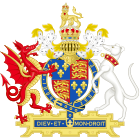| Act of Parliament | |
 | |
| Long title | An Act that Proclamations made by the King's Highness, with the Advice of His Honourable Council, shall be obeyed, and kept as though they were made by Act of Parliament. |
|---|---|
| Citation | 31 Hen. 8. c. 8 |
| Dates | |
| Royal assent | 28 June 1539 |
The Proclamation by the Crown Act 1539 (31 Hen. 8. c. 8), also known as the Statute of Proclamations,[1] was a law enacted by the English Reformation Parliament of Henry VIII. It permitted the King to rule by decree, ordering that "traditional" proclamations (that is, any unable to impose the death penalty or forfeiture of goods)[clarification needed] should be obeyed as "though they were made by act of parliament". In addition the act appointed machinery for their enforcement.[2]
Sir William Blackstone called the Act "a statute, which was calculated to introduce the most despotic tyranny; and which must have proved fatal to the liberties of this kingdom, had it not been luckily repealed."[3]
The Act was once considered to be the height of Henry VIII's despotism. The great efforts made by the King's chief minister, Thomas Cromwell, when drafting the acts of this time show that he was aware of the importance of statute and Parliament.[2]
Cromwell's natural reaction to any problem of government was to draft a bill. However, there were times when an immediate decision or temporary policy was required without having to wait for Parliament. For example, in 1535 it was desired to prevent the export of currency from the realm; Cromwell insisted on finding a relevant statute, although he was relieved to hear from the judges that, in such matters, failing such a statute, the king had the power to issue a proclamation. Nevertheless, Cromwell felt unsatisfied, and hence the Act of 1539, designed to give general legal sanction to royal proclamations.[2]
Cromwell originally intended to allow the common-law courts to enforce these proclamations. However, opposition from the House of Lords forced him instead to accept a council as nominated in the act. This council proved so incapable of doing the work that in 1547, when the Act was repealed, it made no difference to the legality of royal proclamations.[2]
Proclamations would continue to prove controversial, especially when it came to taxation in which it was seen as an arbitrary power, becoming one of the many reasons for the Wars of the Three Kingdoms. Restored Stuart attempts at emulating French absolutism through revival of proclamations would be a factor in causing the eventual Glorious Revolution, leading to the Bill of Rights that entrenched parliamentary sovereignty.
YouTube Encyclopedic
-
1/5Views:7 7963 250553116 340428
-
How To Pronounce Proclamation - Pronunciation Academy
-
Elizabeth I's guardian, a Master of Swans, a king's death announced and more!
-
The Early Tudors: Henry VII and Henry VIII by Charles Edward Moberly Part 2/2 | Full Audio Book
-
Edward VI - The Boy King of the Tudors Documentary
-
David Crowther from the History of England Podcast on Thomas Cromwell
Transcription
References
- ^ "Henry VIII clauses". www.parliament.uk.
- ^ a b c d G.R. Elton England Under The Tudors London: Methuen, 1955, revised edition 1974: Chapter VII The Tudor Revolution: 3 Parliament
- ^ Blackstone (1765-69) Commentaries on the Laws of England, book 1, chapter 7
External links
See also
